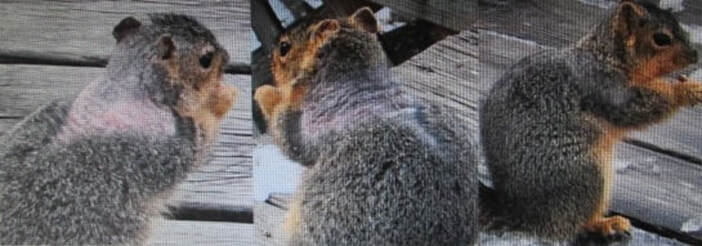|
Please Read
We are not presently licensed to send this medication out of the US! We have been unable to provide our normal treatment for Squirrel Mange due to the Government coming down hard on retailers of the product we use to make our Mange kits. It's a long story, but it was the fact that some people were using this base ingredient to try to prevent getting Covid. Retailers pulled the product off the shelf and left me high-and -dry as far as being able to market Mange treatment kits. ( Which I have done for the last 12 years!) The self-inflicted ban on selling this product was recently lifted, but as expected, the price of it has increased! To keep from having to raise our prices, we researched and came up with the ideal dose of Ivermectin to use based on the body weight of the average squirrel. That dose is around 100 micro-grams which is 1/10th of a milligram. The tiny bottle in the kit contains 32 drops of product which is enough to treat 16 adult squirrels at 2 drop per dose. Dosing is much easier than our former product. You mix two drops in a tiny dab of peanut butter and spread it on a Pecan or English Walnut nutmeat and feed it to the squirrel. Even though we are paying more for the Ivermectin and Inflation has increased all of our costs, We've had to raise our price $0.80 cents for the first time in 9 years from $6.95 to $7.80 ! We conducted a type of clinical trial with our new Ivermectin Oil to make sure that it was as effective as our old method. We asked participants to take before and after photos. A customer, Chris B., gave me permission to use her pictures on this page. Below, you can see the the progression of the treatment on one of the Fox squirrels that comes to feed on her deck. *************************************************************************************** Warning for owners of the following breeds of dogs: Collies, Australian Shepherds, Shetland Sheepdogs, Old English Sheepdogs, and English Sheepdogs. Do Not let your dog come in contact with Ivermectin, even in squirrel sized doses. These breeds have a genetic sensitivity to Ivermectin that can and will lead to death! SEE: https://www.petcarerx.com/article/ivermectin-intolerance-in-collies-and-other-dogs/750 (If you are uncertain, check with your Veterinarian before starting treatment on squirrels!) **************************************************************************************** PLEASE NOTE: Before ordering Ivermectin to treat Mange in Squirrels, make sure that you are treating Mange, as opposed to a skin fungus that is common in late Winter/ early Spring. I recently did a Blog about "Skin Conditions In Squirrels," you can access it HERE. Also note that Ivermectin drops should NOT be used on baby squirrels. The dose needed for them would be so minuscule, that it would be impossible to measure. A drop of puppy or kitten flea drops on the back of the neck has been recommended by many Vets as a better alternative. Mange in squirrels is caused by an itch mite called Sarcoptes scabiei , a tiny insect that boroughs under the skin to feed on the blood of the animal. Female mites will lay their eggs, and when hatched, adds to the misery and intense itching that a squirrel experiences when infested with these vermin. One of the physical dangers to squirrels, besides loss of body hair and the possibility of skin infection, is that the mites consume blood and can drop the squirrel's hemoglobin count,( make them anemic,) and lower their resistance to disease. Anemia can cause squirrels to lose their defensive edge due to lack of energy and make them more vulnerable to predation and attacks from other squirrels who sense their weakness. There are natural and conventional treatments for mange. I've heard from other squirrel caretakers that natural treatment for mange in squirrels consists of topical application of a strong solution of Ionic Silver, plus nutritional support of the squirrel's immune system by proper feeding and supplements such as Nut Squares, or Squirrel Veggie Squares. Natural treatment is reserved for squirrels who are in captivity, or released squirrels who don't mind being handled, because it is nearly impossible to put topical solutions on a wild or released squirrel, unless you have a really close and trusting relationship with that squirrel in the wild. The conventional treatment for mange in squirrels involves the use of Ivermectin. For our Ivermectin in MCT oil the dosage would be 2 drops once per week. Usually, one dose is all that is needed. If a squirrel has a massive infestation involving a large section of their body, you need to wait a week to re-dose! Disclaimer: The above treatment(s) are in no way a prescribed treatment, but merely a report of what I have found to work on wild squirrels. Always check with a licensed Veterinarian before instituting any treatments on any animal. I am very fortunate to have a Vet that treats wild squirrels, but unfortunately, a majority of Veterinarians will not see or take care of them. Please Note: We are unable to ship Ivermectin outside the United States!...Sorry! If you have any trouble ordering please let us know at [email protected]!
|
|
- Home
- Squirrel Formula
- Nut Square Kits
- Squirrel Veggie Squares
- Mange Treatment In Squirrels
- Squirrel Mall
- Blog
- Squirrel Pockets
- Basic Care of a Baby Squirrel
- Squirrels With Severe Health Issues
- Palm Squirrel Skin Disease
- Squirrel Nesting Box
- Bulk Nut Mix Order
- Carbon=60
- Significance of New Wine in the Bible
- Product Page
- Squirrel Pox
- Psalm 41:1

